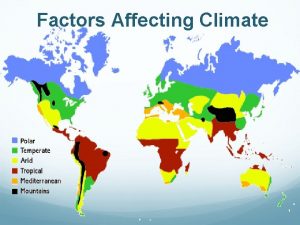Opportunities Challenges and Factors affecting the Exportation of











- Slides: 11

Opportunities, Challenges and Factors affecting the Exportation of Banking and Financial Services

Introduction • International trade is now characterised by global value chains, in which services play a keyrole; • Africa has yet to realise its full potential in this arena. • Understanding how to successfully promote and leverage services exports in particular banking services may encourage African nations shape policies that are service-provider friendly and boost participation in regional and global trade

The Modes of Supply 1. Cross Border - from the territory of one Member into the territory of any other Member 2. Consumption Abroad - in the territory of one Member to the service consumer of any other Member 3. Commercial Presence - by a service supplier of one Member, through commercial presence, in the territory of any other Member 4. Presence of Natural Persons - by a service supplier of one Member, through the presence of natural persons of a Member in the territory of any other Member

Export of Financial/Banking Services • In the case of financial services, for various reasons regarding risk, most governments only allow banking services through established businesses through a commercial presence (or Mode 3). Whilst cross-border supply (Mode 1) of financial services is becoming increasingly possible through the Internet, due to information and communication technology (ICT), most governments do not allow such, except for very limited areas such as foreign exchange transactions and clearing business among firms, not end consumers. • The emergence of mobile money or at least mobile payments systems through mobile network operators (MNOs) is starting to revolutionise this activity

Major Obstacles in Export of Banking Services • Obstacles to international trade in banking services arise for the most part because of the special nature of banking services and the importance that all nations place on the regulation of banking operations. In every country, banking operations are subject to special regulations and restrictions. • These regulations and restrictions are almost always intended to ensure the stability of national banking systems, to provide national authorities with effective instruments for economic management, or generally to encourage thrift and other social virtues

Case Study from Africa • The cited case of Nigeria (AU Study) • Nigeria has become a leader in the African banking industry. Financial services accounted for 2. 3% of Nigerian GDP in 2013 and demonstrated 30% growth in nominal terms the same year. • Nigeria is also one of the successful exporters of banking services. Nigerian banks’ external assets (proxy for exports of banking services) increased significantly from N 250 million in 1980 to N 1, 702, 513 million in 20111. Of the 20 Nigerian banks, 11 had operations in other African countries as of 2012, with Ecobank Nigeria operating in 35 other African countries. • Eight Nigerian banks also had international operations beyond Africa, including in London, Paris, New York, Dublin, Hong Kong, and mainland China.

Nigeria Case Study Cont’ • • • The Nigerian banking sector has witnessed distinct cycles and reforms, with the most recent carried out after 2005 in a phase of bank consolidation. As elsewhere, the industry in Nigeria is highly regulated due to its economic importance. The recent banking reforms have stabilised the banking system and encouraged both the recovery of previous bad loans and fresh capital accumulation. Other than the creation of an appropriate regulatory framework, there is no evident government policy strategy to support financial or banking services exports; export development programmes usually target goods. One exception to this is the Financial System Strategy (FSS 2020). Although the main focus of this strategy is domestic financial services, it also aims to enhance integration with external financial markets. Nigerian banks’ international expansion appears to have been carried out at their own initiative and without federal government support or facilitation. It suggests that Nigerian banks’ success at home (induced by the bank consolidation policy and conducive regulatory environment) was the main factor enabling them to increase the size of their balance sheets and engage in global competition

Zimbabwe • Currently financial/banking services contribute . . . To GDP • Number of Financial/Banking Institutions – • Institutions with Commercial Presence in other countries

Challenges to Exporting • Mode 3 on Commercial Presence – unavailability of start up capital to set up in other countries, • Regulatory framework which in not peculiar to Zim alone – as stated earlier there are exchange controls in the region to reduce risk and stabilize the sector • On accepting deposits, the foreign currency constraints are limiting the ability to provide this service to non residents

Opportunities for Zimbabwe • Correspondent Banking Services – we are not playing correspondent bank to anyone because of the macroeconomic situation. This is a service that can generate economic benefit to the country • Discussions by the SADC Committee of Central Bank Governors – to innovate on exchange controls aimed at increasing regional flow of banking services • Support from other sectors – growth in exports in other sectors (both merchandise and services)stimulate growth in exports of financial services

The Offer to SADC q Zimbabwe submitted its list of commitments (Banking Services) in the context of the SADC Protocol on Trade in Services as follows: • Acceptance of deposits and other repayable funds from the public (CPC 81115 – 81119) • Lending of all types, including consumer credit, mortgage, credit, factoring and financing of commercial transaction (CPC 8113) • Financial leasing (CPC 8112) • All payment and money transmission services, including credit, charge and debit cards, traveller’s cheques and banker’s drafts (CPC 81339**) • Guarantees and commitments Merchants banks are also authorized to (CPC 81199**) underwrite new issues manage portfolios raise development capital arranging financing for mergers and takeovers • For all the above there are no market access limitations or national treatment limitation except foreign equity participation which is bound at 60%
 What are the opportunities in informational
What are the opportunities in informational The nucleolus is composed chiefly of:
The nucleolus is composed chiefly of: Importation martinique
Importation martinique Greater bay area opportunities and challenges
Greater bay area opportunities and challenges Systemic factors that influence wound healing
Systemic factors that influence wound healing Factors influencing oxygenation
Factors influencing oxygenation Rotational spectral lines
Rotational spectral lines What are the three factors that affect solvation
What are the three factors that affect solvation Objective of wages and salary administration
Objective of wages and salary administration Factors affecting mobility and immobility
Factors affecting mobility and immobility Split-half reliability example
Split-half reliability example What factors shape the climate in canada
What factors shape the climate in canada





















